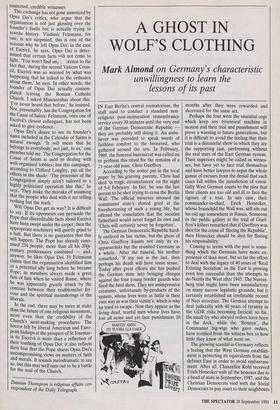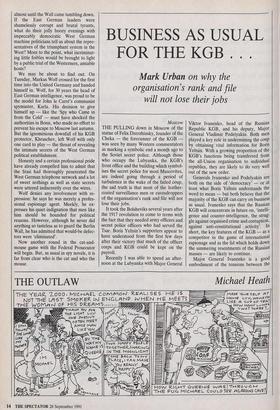A GHOST IN WOLF'S CLOTHING
Mark Almond on Germany's characteristic
unwillingness to learn the lessons of its past
IN East Berlin's central crematorium, the staff used to conduct a standard non- religious post-incineration remembrance service every 30 minutes until the very end of the German Democratic Republic they are probably still doing it. An unbe- liever was provided to speak words of faithless comfort to the bereaved, who gathered around the urn. In February, 1989, the funereal bureaucrat was called on to perform this ritual for the remains of a 21-year-old man, Chris Gueffroy. According to the notice put in the local paper by his grieving parents, Chris had died 'in tragic circumstances' on the night of 5-6 February. In fact, he was the last person to be shot trying to cross the Berlin Wall. The official mourner intoned the communist state's shared grief at the foreshortening of such a young life, but offered the consolation that the socialist fatherland would never forget its own and `Chris will certainly never be forgotten'.
The German Democratic Republic hard- ly outlived its last victim, but the ghost-of Chris Gueffroy haunts not only its ex- apparatchiks but the reunited Germany as a whole. After the funeral, his mother remarked, 'If my son is the last, then perhaps his death will have some sense.' Today after great efforts she has pushed the German state into bringing charges against the four young border guards who fired the fatal shots. They are unimpressive creatures, unfortunate by-products of the system, whose lives were as futile in their own way as was their victim's, which is why he tried to escape. Now they appear as the living dead, tearful men whose lives have lost all sense and yet face punishment 18 months after they were rewarded and decorated for the same act.
Perhaps the four were the essential cogs which keep any tyrannical machine in motion and their trial and punishment will prove a warning to future generations, but it is difficult to avoid the feeling that their trial is a distasteful show in which they are the supporting cast, performing without the real stars of the East German system. Their superiors might be called as witnes- ses, but have yet to face trial themselves and have better lawyers to argue the whole gamut of excuses from the denial that ouch cases fall within the jurisdiction of essen- tially West German courts to the plea that their clients are too old and ill to face the rigours of a trial. In any case, their commander-in-chief, Erich Honecker, whose brainchild the Wall was, still sits out his old age somewhere in Russia. Someone in the public gallery at the trial of Guef- froy's killers remarked that if Gueffroy was shot for the crime of 'fleeing the Republic', then Honecker should be shot for fleeing his responsibility.
Coming to terms with the past is some- thing which the Germans have more ex- perience of than most, but so far the effort to deal with the legacy of 40 years of 'Real Existing Socialism' in the East is proving even less successful than the attempts to de-Nazify the West after 1945. The Nurem- berg trial might have been unsatisfactory on many narrow legalistic grounds, but it certainly established an irrefutable record of Nazi atrocities. The German attempt to deal judicially with 40 years of tyranny in the GDR risks becoming farcical: so far, the small fry who obeyed orders have been in the dock, while the `Women', the Communist big-wigs who gave orders, have testified from the witness box to how little they knew of what went on.
The growing scandal in Germany reflects a feeling that the West German establish- ment is protecting its equivalents from the defunct East in order to avoid embarrass- ment. After all, Chancellor Kohl received Erich Honecker with all the honours due to a head of state in September, 1987, and the Christian Democrats vied with the Social Democrats to pay court to their neighbours almost until the Wall came tumbling down. If the East German leaders were shamelessly corrupt and brutal tyrants, what do their jolly boozy evenings with impeccably democratic West German machine politicians tell us about the repre- sentatives of the triumphant system in the West? More to the point, what incriminat- ing little foibles would be brought to light by a public trial of the Westerners, amiable hosts?
We may be about to find out. On Tuesday, Markus Wolf crossed for the first time into the United Germany and handed himself in. Wolf, for 30 years the head of East German intelligence, was proud to be the model for John le Carres communist spymaster, Karla. His decision to give himself up — like the 'Spy who Came in from the Cold' — must have shocked the authorities in Bonn, who made no effort to prevent his escape to Moscow last autumn. But the ignominious downfall of his KGB protector, Khruschev, left Wolf with only one card to play — the threat of revealing the intimate secrets of the West German political establishment.
Honesty and a certain professional pride have already compelled him to admit that the Stasi had thoroughly penetrated the West German telephone network and a lot of sweet nothings as well as state secrets were uttered indiscreetly over the wires.
Wolf denies any involvement with re- pression: he says he was merely a profes- sional espionage agent. Meekly, he ex- presses his quiet indignation that men like him should be hounded for political reasons. However, although he never did anything so tasteless as to guard the Berlin Wall, he has admitted that would-be defec- tors were 'eliminated'.
Now another round in the cat-and- mouse game with the Federal Prosecutor will begin. But, as usual in spy novels, it is far from clear who is the cat and who the mouse.



































































 Previous page
Previous page